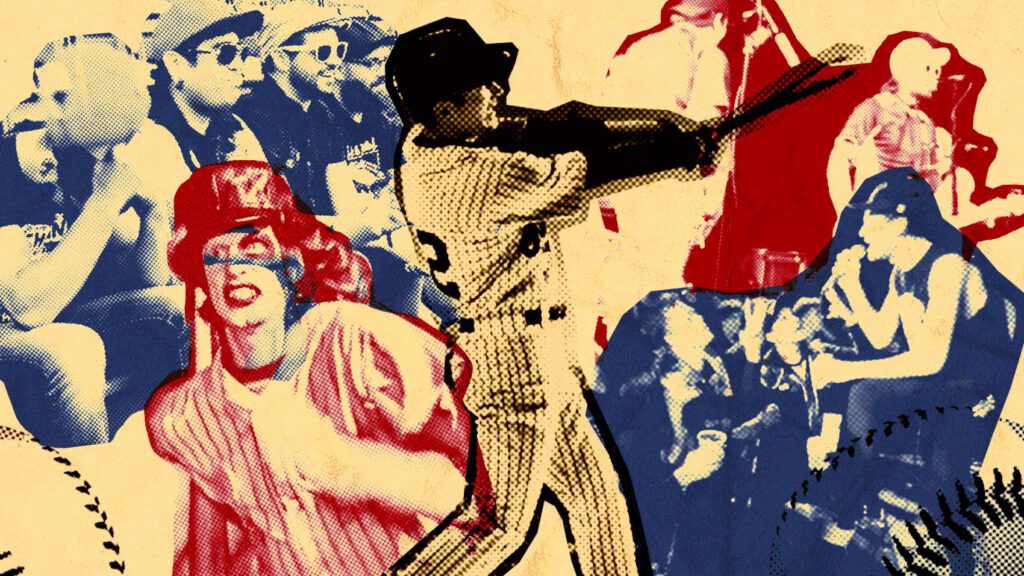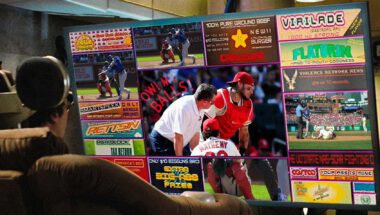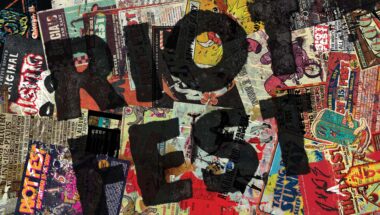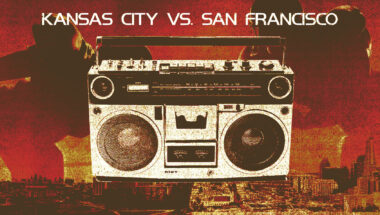Sportsball (n.) — a term used sarcastically by non-sports fans to show that they don’t know or care that much about sports (urbandictionary.com).
The Springfield Isotopes have appeared in just eight of The Simpsons’ whopping 656 episodes to date, but not the all-time classic “Homer at the Bat.” They’re Springfield’s minor league baseball team, all right, but if you’re not a Simpsons superfan, you may mistakenly conflate them with the Springfield Nuclear Power Plant softball team; in said all-time classic, Mr. Burns loads his underachieving company squad with superstar major league ringers ranging from Ken Griffey Jr. and Don Mattingly to Roger Clemens and Darryl Strawberry, all of whom eventually… well, we can’t spoil a 27-year-old episode, can we? The Isotopes, on the other hand, are simply the bush leaguers that toil in Duff Stadium, and were almost relocated to Albuquerque, and…
Oh, sorry, what was that? Why should I care? Whether or not you’re an aficionado of the longest-running American sitcom of all time, the Springfield Isotopes are hardly a household name. But they clearly meant plenty to Evan October, founder of the Vancouver-based punk band the Isotopes—even if, as he confesses, “I’m only a casual Simpsons fan. I mean, I like it, but when I was a kid, if I was turning on the TV, it was to watch baseball or Seinfeld. But because of this name, everyone always assumes I wanna talk softball, if you catch my drift.”
We catch his drift, just as effortlessly as we catch the hook-heavy arsenal his band has fired off since 2007’s 7-inch leadoff single, uh, “Lead-Off Single”. You may have noticed that spring has sprung and America’s pastime has begun. Or, if you’re the kind of person who obnoxiously insists on using the term “sportsball” anytime someone excitedly discusses, say, whether the Cubs should trade Kris Bryant now or sign him to a mega-extension, you may not have noticed. That’s what sportsball people are all about: well aware of professional sports’ general existence, but for various (often very understandable) reasons, too damn cool—some would even say “too punk”—for it.
Well, dearest cynics, this feature is still for you, because it’s about the confluence of baseball with all kinds of heavy music: namely punk, hardcore and grindcore. Which, as you’ll read, has spawned outsider art that is deeply offbeat, thoughtfully woke and, more often than not, literally pants-shittingly hilarious.
The Isotopes’ most recent addition to their catalogue is a cover of John Fogerty’s 1985 FM staple “Centerfield” (“Put me in, coach!/I’m ready to play!”), albeit charmingly spelled “Centrefield,” Great White North-style. October admits that adapting the still-ubiquitous chestnut may qualify as “low-hanging fruit,” but ambitiously aspires to tackle the likes of the Cardigans’ “My Favourite Game,” or the Greenhornes and Holly Golightly’s “There Is an End.” “Those aren’t baseball tunes, but that’s kinda the point,” he observes. “We can make them original in a certain sense by adopting to them a baseball theme. In a genre full of standard operators, we try to throw as many curveballs as possible while still working within the strict, self-imposed framework of ‘baseball punk.’”
And excel within that framework they most certainly do. Over the course of two albums, three EPs, and multiple singles, the collective (alternately known as Isotopes Punk Rock Baseball Club) dives way deeper than Sandlot-esque nostalgia for scorching summers, preadolescent shit-talk, and losing your lone ball to the ferocious dog lurking just beyond the outfield fence. They’ve written songs about the 2011 kidnapping of Venezuelan catcher Wilson Ramos, the family-shattering visa woes of glove-only Cuban defector Rey Ordóñez, and even reimagined one of the vilest anecdotes you’ll ever hear: the infamous audio capture of George Brett haranguing a fellow Kansas City Royal during spring training with the sordid, vividly descriptive tale of shitting his pants at the Bellagio in Las Vegas. Isotopes lead guitarist Dallas Duststorm can recite it verbatim.
Granted, a lot of the aforementioned may be inside inside baseball, but October’s lyrics turn the overarching tales into relatable human interest stories, while cleverly nodding to the more delicious, bizarre details—all while the band barrels ahead like the Buzzcocks and Ramones lifers they are, never giving into the genre’s more childish flourishes. “When I started a baseball-themed pop punk band in 2004, I got a lot of sideways looks from a lot of intelligent people who have by now quit the music business altogether,” October notes; and in fact, things have changed so much in 15 years that actual intelligent people are paying attention. The Isotopes were featured heavily in Baseball Punx, a 2017 documentary short that spotlighted this surprisingly fertile subculture. The film’s soundtrack features a (frankly, astonishing) 14 different bands blasting through 15 baseball-themed songs.
Baseball Punx begins with live footage of Columbus, OH outfit Slugging Percentage quoting Walt Whitman’s 1846 observations on the nascent game as feedback swells, and it only gets better from there. “I think it’s interesting to find out the people in our world that like sports,” notes Jeff Rosenstock/Bomb the Music Industry! bassist John DeDomenici. “Usually, for the most part, we start doing this to get away from the jocks.” Indeed, Ramshackle Glory clarinetist/trans woman Alyssa Kai wrestles with the acknowledgment that baseball, like punk rock, teaches its practitioners to deal with failure, yet the sport’s inherent toxic masculinity has historically alienated and hurt her queer punk friends.
It’s not hard to see where Kai is coming from. After last year’s All-Star Game, Milwaukee Brewers flamethrower Josh Hader ran some apology laps when some brutally dumbass high school-era tweets like “I hate gay people” and “White power lol” were unearthed. Whether the preceding were merely “edgy” teen irony or representative of a deeper, more sinister bias, it often feels like Hader represents the norm, whereas Washington Nationals closer Sean Doolittle is a refreshing corrective/outlier. When he responded to the Hader controversy last year by tweeting, “It sucks to see racist and homophobic language coming from inside our league—a league I’m so proud to be a part of that I’ve worked really hard to make a more accepting and inclusive place for all our fans to enjoy,” he wasn’t kidding. In 2015, Doolittle and his wife Eireann Dolan raised enough money for an Oakland A’s Pride Night to buy 900 tickets, which they subsequently donated to local LGBT youth groups.
Baseball Punx director Jak Kerley (the video production manager for the South Atlantic League’s Greensboro Grasshoppers by day) emphasizes baseball’s more historically progressive social stances in the film—Jackie Robinson breaking the color barrier in 1947; out-and-proud former big leaguer Billy Bean working to dispel homophobia in clubhouses across the country—but humbly acknowledges that the political focus was the happy byproduct of a documentarian simply listening to his subjects.
“While it was definitely something that was on my mind, I never intended to make this a political documentary,” Kerley admits. “It was supposed to be a short, five-minute fluff piece about fun songs and baseball. However, more and more people kept talking about it, and it was too hard to ignore. If I intended to make a longer documentary, I certainly would have included a lot more stuff being critical of baseball’s political stances, too. I’d certainly argue—not even much of an argument, really—that the NBA is politically much more progressive than [Major League Baseball], something I’ll admit is not addressed in my documentary at all.”
Alternately funny, touching, and thought-provoking, Baseball Punx premiered on ESPN.com in February 2018. Kerley is currently focusing on helming assorted punk videos, as well as a comedy webseries about punk called Good Ol’ Punx (“Imagine The Hard Times articles, but as short films”). He wouldn’t be opposed to expanding Baseball Punx into a feature-length documentary, and has more than his share of no-brainer potential interviews that could expand the scope, remarking, “I feel like comedian Rhea Butcher would have been able to provide some really great insight on baseball from a political leftist view.”
One of those no-brainers is Thrice drummer/former Pepperdine Waves walk-on Riley Breckenridge, and get pumped, metal fans—it’s ouroboros time! Breckenridge also pounds the skins in baseball-themed grindcore supergroup Puig Destroyer (featuring members of Kowloon Walled City and Curl Up and Die), who have been blasting away with sabermetrically friendly tantrums like “Stop Fucking Bunting” since 2014. The moniker is a play on critically acclaimed Beltway grinders Pig Destroyer, the added vowel being a reference to cannon-armed Cuban sensation Yasiel Puig. Nobody in Pig Destroyer commented about this idiosyncratic homage until earlier this month, when PxDx bassist John Jarvis released “Beat the Shift,” the first track off an EP of his own baseball-themed grindcore project, its moniker referencing Kowloon Walled City by way of the St. Louis Cardinals’ second baseman: Kolten Wong City.
And you thought “Who’s on First” was hard to follow.
“It came up in my Google Alerts for Kowloon Walled City, and initially I assumed I was having an acid flashback,” marvels Puig Destroyer/Kowloon Walled City bassist Ian Miller. “We had heard that the Pig Destroyer guys weren’t very stoked on our homage, so it came as a total shock. I didn’t know John personally, but I reached out to him to let him know we were 100 percent into it, and we exchanged a couple of friendly messages. We’re still kind of incredulous, though!”
For Jarvis’s part, he says that the music contained on the Expressed Written Consent EP (to be released, naturally, Opening Day on March 28) has only been in the works since late February. The ridiculous serendipity continues in that, despite living in Baltimore, Jarvis is a lifelong Cardinals fan, hence a for-real Wong fan, the only player on the roster that would let Jarvis’s new band name clap back at a Puig Destroyer member’s side gig. “I was in the stadium when Lou Brock got his 3,000th hit,” Jarvis beams. “And during the ’80s, my dad worked at Mike Shannon’s (a steakhouse owned by the Cardinals announcer), so he’d come home with autographed memorabilia and cool stories of meeting the players.”
For many baseball fans, Wong’s claim to fame is being picked off first base to end Game 4 of the 2013 World Series—the first and only time a game of that magnitude has ended with a pickoff. But like all notoriously polite Cards fans, Jarvis is forgiving. “That was a big one,” he concurs. “And if you’ve ever been picked off in a game—or caught stealing, for that matter—it hurts. But to end a World Series game like that, ouch. There’s a lot of Cardinals fans that won’t let that go, but Kolten is a good player, and I expect a Gold Glove this year.”
While grindcore and pop punk may be as diametrically opposed as, say, baseball and football, this story is all about the glory of unlikely inclusivity. So, for all your sportsball-sayers rolling your eyes, none of the above are actively trying to recruit you to this super-culty fold (well, maybe the author). In fact, Miller offers perhaps the best perspective on the whole bizarre crossover when asked what he would say to your everyday punk kid who thinks sports are lame:
“I mean, they’re not wrong, really. There’s tons of lame shit about sports and sports culture, just like there is about punk and punk culture. But you can be a punk and enjoy sports; if that’s part of who you are, you don’t have to renounce it to be cool or punk. That’s what I learned, anyway. Not that I’ve ever been accused of being cool.”




